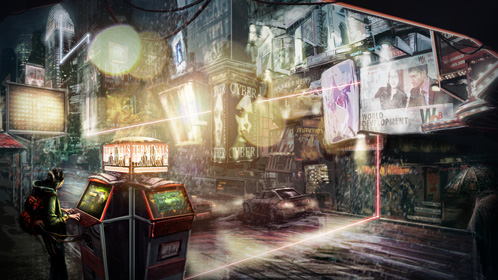
art by Void lon iXaarii
Unrealized Potential
by Scott E. Ritter
Mom and I had arranged to meet Dad at the town museum. The special exhibit, "Unrealized Potential," only showed once each year from midnight until six AM on the summer solstice. The season's young heat hung in the humid air after the warm June day, and the first bold insects interrogated the darkness around the tired wooden building with their tentative rasping calls.
It was only eleven thirty, but locals of all ages had already begun to gather. For many of them, attending on even such a mild night was not a trivial undertaking. They rolled up in wheelchairs, teetered on prosthetic legs, tapped red-tipped canes, or were limply carried by parents and determined friends. Others doggedly towed along their own life support mechanisms--tenuous tangles of wet tubes and wires precariously perched on squeaking wheels.
There were also a disconcerting number of individuals from nowhere in particular. Their faces were pockmarked by the restless fingernails of drug addiction or scarred by lives gone wrong in other sordid ways; and they dressed in rags whose foul odors stubbornly resisted dissipation by the soft breeze.
Most incongruous were their expressions--so many genuine and excited smiles from such haggard visitors.
At last, the nearby clock tower chimed twelve-o'clock, the front gates opened, and the strange crowd made its slow, faltering way up the steps and ramps into the entrance hall. The makeshift stalls bordering the anteroom were promptly filled, coat-check style, with wheelchairs, canes, walkers, unstrapped limbs, oxygen tanks, and all the rest of the undesired but compulsory paraphernalia as the crowd moved with newfound poise and independence into the main exhibit hall.
"There he is!" exclaimed Mom when Dad appeared. We hurried over to him, eager not to waste a single moment. Six hours was such a short time after an entire year.
Together, we milled and churned with the others, sipping cool sweet wine and nibbling bits of cakes, meats, and freshly-sliced fruits.
The oldest guests strutted about, flaunting restored libidos and discussing long-forgotten plans with lucid certainty. The blind browsed the artworks on display with eyes now clear and wide, commenting on the rich colors, forms, and textures of each sculpted medium and canvas.
Some took up brushes of their own and painted alongside steady-handed Parkinson's patients at the crafting tables set up for everyone to use. Where the tables ended, the floor had been cleared and the deaf danced to baroque chamber music played by a dexterous string quartet of Thalidomide casualties.
Most enchanting of all, however, were the children. Grinning parents set down crippled sons and daughters on stable young legs to run and frisk among themselves, shouting, jumping, and laughing. The street people, now smooth-skinned and smelling as fresh as the breeze itself, joined in their fun. They played strong but gentle scoundrels in games of "pig-pile on the grownup" with raucous youngsters and read fairy-tales (with all the right voices) to the quieter ones.



